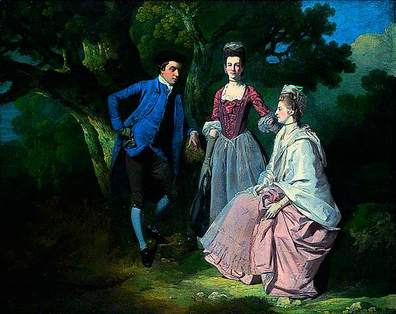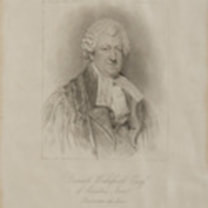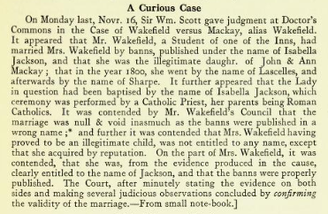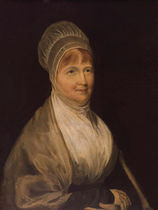One rub after another frequently threatens us with a view of poverty and dependence
How I should enjoy a purse which always held enough!
|
Family
Priscilla Wakefield was born in Tottenham on 31 January 1751, the eldest daughter of Daniel Bell of Stamford Hill, and Catherine Barclay, grand-daughter of the celebrated Robert Barclay, who wrote the famous Apology for the Quakers. Catherine Bell was the daughter of David Barclay of London who was a prominent member of the Quaker movement and one of the founders of Barclays bank. Priscilla was the eldest of ten children, eight girls and two boys. She had a great deal to do with teaching them. On 3 January 1771 she married Edward Wakefield, merchant of London, at the Tottenham meeting house. They lived in London for some years returning to Tottenham after their three children were born. Despite the comfortable situation into which she had been born, Priscilla Wakefield was unfortunate in her marriage and family. Edward Wakefield was not a successful merchant in the city, of Lad Lane (now Gresham Street), and lost their wealth through risky investments and gambles. According to one of their sons: my father continued the commercial concerns in which he was engaged and which I have always heard were concerns of great magnitude, the younger Partner, Mr Simpson being an MP. However when I was an infant, to the great astonishment of everybody the house failed, though some engagements with Mr Alexander Fordyce. As the Hazel Mews papers note: [Edward] seems in fact to have been entirely lacking not only in business capacity, (for his life as far as we know it, is little more than a record of failure) but also in the strength of mind necessary to meet misfortune bravely, or to bear if patiently. Priscilla’s journals contain many references to his weakness, and whenever anything disagreeable happens, ‘Mr W has a fit of hysterics’. Money, money. What a plague!
Priscilla turned to writing to support the family and despite all of the challenges in her life she continued to lead on local efforts to relieve the poor and support national Quaker campaigns such as the Abolitionists movement. Dawdled away the whole day in a vexatious manner with Mr Wakefield & Daniel –
The exercise of patience was the best work I did. |
The consideration of money matters depresses me, as I am
certain our expenses exceed the limited sum. 6 August 1796 Pecuniary difficulties press hard upon my mind 21 October 1796 Although the end of the century saw Priscilla having to take on responsibility for the earning the family income, she referred to the first decade of the 1800s as her years of 'storm and stress' when financial and family troubles overwhelmed her. Bankruptcy loomed and there were multiple law suits between the family members which resulted in estrangements.
EW was tricked out of a fine trade, by which we are once more set adrift ... the same sum of reserve that I have treasured up as a bank against future wants has been appropriated to immediate urgencies and is probably lost forever. 1801 Went to London and spent a most agitating day, using extraordinary efforts to ward off a bankruptcy, and procure ready money to satisfy these sharks. 1804 At the end of 1807 there were five suits at stake - two involving Edward, Dan's trial and two for his wife's debts. Priscilla was unsuccessful in recruiting the family to her side noting that 'the displeasure of the family seems to take the place of their pity'. |
Priscilla and Edward had three children who survived into adulthood, two sons and a daughter. Edward Wakefield, the elder son, who was a surveyor and land agent; and Daniel Wakefield, the younger son, was the author of several pamphlets on agricultural and political economy. Priscilla was close to her daughter, Isabella, (Bell), who married the Quaker brewer Joshua Head in 1799 and moved to Woodbridge near Ipswich.
Priscilla gave birth to a son, Edward, in 1772 who died at two weeks of age and another son, Barclay, several years later who also died - there may also have been a third son who died in infancy - the records are unclear. Jonathan Bell’s memoir states that ‘two or three of Priscilla’s infants died’.
Priscilla gave birth to a son, Edward, in 1772 who died at two weeks of age and another son, Barclay, several years later who also died - there may also have been a third son who died in infancy - the records are unclear. Jonathan Bell’s memoir states that ‘two or three of Priscilla’s infants died’.
|
Priscilla Wakefield was close to her daughter, Bell, but both of her sons caused her considerable anxiety at various times in their lives, as did several of her grandsons. She often had to take her grandchildren in for long periods of time and take responsibility for their education.
Priscilla's nephew Daniel Gurney wrote that Edward and Dan were 'clever but unprincipled men' |
|
Isabelle Wakefield 1773 - 1841
|
Isabella married the Quaker brewer Joshua Head in 1794 and moved to Woodbridge near Ipswich. Priscilla often visited finding refuge in 'the happy, tranquil state of her family'. Bell had 11 children. Joshua died only a few years after Priscilla retired to live with her daughter in 1813. Little is known of Bell's life but the obituary of her daughter Lucy notes that she was the granddaughter of Priscilla Wakefield and that her mother was 'foremost in all religious and philanthropic work in Ipswich’
|
|
Edward Wakefield 1774 - 1854
For more information: Edward Wakefield
|
"Edward’s plans as usual too wild for the promotion of a sober uniform system of life
15 Jan 1799 Edward Wakefield married Susan Crush in 1791 at the age of 17 without consulting his parents and as their family increased rapidly it was Priscilla who would take in the grandchildren and support poor Susan as her health and state of mind deteriorated. Susan died in 1816 worn out and neglected by her husband. Edward married Frances Davies in 1822.
Edward became a farmer near Romford in Essex but he also spent time in Ireland writing a well received book An account of Ireland, Statistical and Political, published in 1812, which is seen as a valuable account of Ireland in the early years of the nineteenth century. A few years later he establishedhimself as a land agent in London. He gave evidence given to the 1815 Parliamentary Committee on Madhouses which examined the conditions under which the insane were confined and became a leading advocate of reform. |
|
Daniel Wakefield 1776 - 1846
For more information: Daniel Wakefield
|
My dan is one of my first comforts but few days
there are that my heart does not ache for him 8 September 1799 Priscilla's diaries are full of concern for her second son, Dan, who did not happy at school and was educated by private tutors. He appeared to have settled when he was admitted as a student to Lincoln's Inn, where he was called to the bar in May 1807. However he had married on impulse and tried to have the marriage annuled as Joseph Farington records in his diary of that year. His first wife Isabella Wakefield formerly Jackson aka Mackie, swindled him and with her mother, landed him with debt. She died in 1813 by her own hand. Dan Wakefield later married Elizabeth Kilgour. There do not appear to have been any children.
Dan Wakefield was active in the affairs of Lincoln's Inn and seen as an able barrister as well as a writer on political economy. |
Public exposure, disgrace, enthralment, ruin
to my beloved son now stare me in the face 12 January 1806 |
|
Elizabeth Fry 1780- 1845
Niece of Priscilla Wakefield |
Elizabeth Fry (nee Gurney), the daughter of Priscilla's sister Catherine became best known as a prison reformer after visiting Newgate Prison in London. She remained dedicted to humanitarian work throughout her life opening a training school for nurses and helping the homeless, establishing a "nightly shelter".
There are many memorials and monuments to Elizabeth Fry, acknowledging her contribution to prison reform, education and as a prominent member of the Quakers, around the country. |
Contact: [email protected]
|




